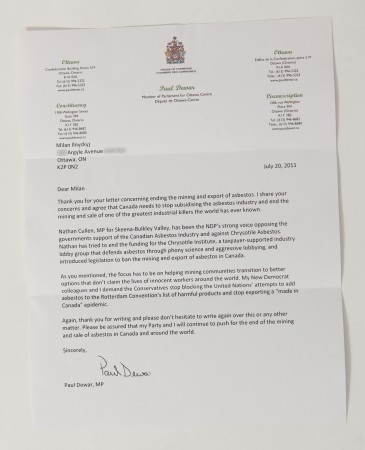Around Canada Day, I wrote a letter to Paul Dewar, my Member of Parliament, about Canada’s export of crysotile asbestos. It seemed classier than holding up a giant “Shame on Canada, Asbestos = Cancer” sign during the Royal Visit.
Today, I got a response setting out his position on the issue:
Any pro-asbestos residents of Ottawa Centre should start bombarding him with strongly worded letters immediately. I am curious what sort of response they would get; hopefully, the same statement of policy with an explanation of why Dewar disagrees with those who favour Canada’s current policy of asbestos support.
It’s good that he has staked his colours to the mast on the issue. Constituents who are concerned about the issue of asbestos should make sure he has voted along these lines the next time the issue arises in the House of Commons. By then, I expect, I will have a new MP (due to me moving).
Asbestos export is an issue I first raised here some time ago.


Here is my original letter. Note that it is addressed to the Minister of the Environment, with a carbon copy to my Member of Parliament.
Canada’s continuing support for the tar sands indsutry, manifested in behaviours like blocking international regulation and sponsoring domestic lobby groups, is inappropriate and an embarrassment. People quite rightly interpret this behaviour as a cynical decision to protect a few votes in Alberta by continuing to sicken and kill people in other countries and generations. The fact that some jobs depend on a behaviour continuing does not mean that the behaviour is a
good thing, or even acceptable. The age of fossil fuels is now closing; the documented climate risks are such that the stuff should not be extracted and burned.
In spite of the economic interests of a few people, Canada should join the rest of the world in recognizing that fossil fuels pose unacceptable risks to the future of humanity. There have been many cases in human history where a product or behaviour once considered to be safe has turned out not to be. We no longer x-ray feet to size people
for shoes, for instance, and most of the world has stopped producing asbestos. The recognition that something is dangerous carries economic
consequences for the people who make it, but it must be recognized that they do not have a right to persist in wilfully hurting people. They certainly should not have government assistance in doing so.
Please support the UNFCC process and work to phase out Canada’s practice of exporting tar sands oil. Stop supporting the tar sands industry. By all means, provide some sort of retraining to those working in the industry. Just don’t allow a history of harmful behaviour to serve as a license to persist in the same. When we discover that a company’s behaviour is sickening and killing people, we expect them to stop. We do not expect our politicians to go out of their way to provide them with money and favours, so they can carry on doing what they have in the past.
Good letter, by the way, and heartening to get a positive response. My tongue-only-slightly-in-cheek exercise above was just noting some of the parallels. I’ve used asbestos production as an example with deniers who maintain that because oil/coal/gas are both natural and useful, there is no ethical problem in exploiting them.
Hi, asbestos is a terrible substance, here in Perth we have a massive problem with asbestos, not mining asbestos could have been very helpfull in stopping the problem.
That last comment is spam but I will leave it up because it proves a point. The removal of asbestos from buildings in countries like Australia is a sufficiently large and profitable business that there are people spamming blogs to sell the service.
This should probably be taken as a sign that it is a mistake for countries like India to be putting up buildings made from the stuff now. They will cause illness for years, and then probably cost a lot of money to decontaminate or demolish later.
Yes, nice decision (to leave the spam in this case).
I tried making the same parallel in another online discussion recently (making the parallels fairly obvious I thought) and my interlocutor (an academic researcher) seemed to totally miss the point and simply asked me to stop accusing him of supporting asbestos since he knew nothing about asbestos (I was accusing him of supporting the expansion of coal production in Australia and of saying that there was no moral reason for switching to renewables any faster than we absolutely have to, using asbestos as a parallel natural substance that most people think Canada does not have a right to exploit for profit.)
As I understand it, asbestos is currently only in widespread use in relatively poor countries. From a poverty reduction perspective, I hope that in a couple of decades they will have become rich enough that they will be carefully ripping the stuff out rather than installing more.
Of course, from a climatic perspective I hope that their economic development doesn’t follow the same carbon intensive path as most rich countries today have taken. Billions more people with the wealth and carbon intensity of North Americans or Australians would translate into enormously greater global greenhouse gas pollution – if there are even enough fossil fuels left to drive an expansion in wealth of that kind.